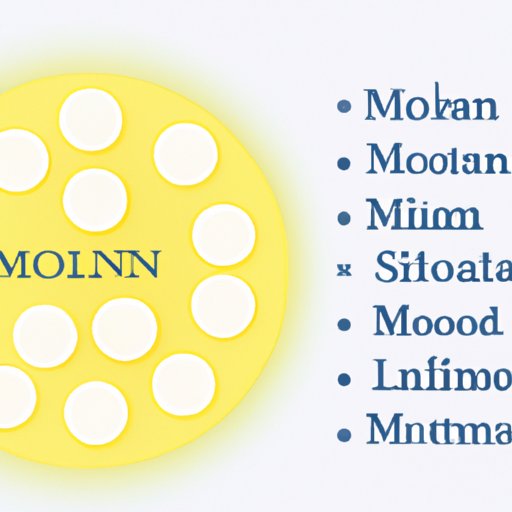
I. Introduction
Sleep is a crucial aspect of our lives that affects our physical and mental health. Getting enough quality sleep is vital for our overall well-being. However, many people struggle with falling asleep or staying asleep, leading to sleep deprivation, which can affect their daily life. This is where melatonin comes in, a hormone that is commonly used as a sleep aid. In this article, we will explore the science behind melatonin and how it affects sleep. We will examine the benefits, side effects, and recommend how much melatonin you should take to improve your sleep.
II. The Science Behind Melatonin: Understanding How It Makes You Sleepy
Melatonin is a hormone produced by the pineal gland in the brain, which regulates the sleep-wake cycle. It is released at night when it is dark and helps us fall asleep and stay asleep. Melatonin is triggered by the body’s internal clock and the amount of light we are exposed to during the day.
When it is dark, the pineal gland starts producing melatonin, and its levels increase steadily throughout the night until the early hours of the morning. The levels of melatonin then gradually decrease, signaling the body to wake up. This is why it is vital to maintain a regular sleep-wake cycle by sleeping at the same time every night and waking up at the same time in the morning.
III. Myth or Fact: Does Taking Melatonin Actually Help You Sleep?
Many people take melatonin as a sleep aid, but the scientific evidence on its effectiveness is mixed. Some studies have shown that melatonin can help people fall asleep faster and improve their sleep quality, while others have found no significant effects or inconsistent results.
It is important to note that melatonin may not work for everyone. Factors such as age, the severity of sleep issues, and individual differences in melatonin production can influence its effectiveness as a sleep aid. It is also not a magic pill that can cure all sleep issues without addressing the underlying reasons for sleep disruptions.
IV. Discovering the Natural Power of Melatonin for a Good Night’s Sleep
The body naturally produces melatonin, and there are ways to naturally boost its levels for better sleep. Exposure to natural light during the day, limiting exposure to electronic devices before bed, and practicing relaxation techniques such as meditation can help promote healthy melatonin production.
Other natural ways to improve sleep quality include creating a sleep-conducive environment, such as keeping the bedroom cool, dark, and quiet, avoiding caffeine before bed, and establishing a regular sleep routine.
V. The Benefits of Melatonin: How it Improves Your Quality of Sleep
Getting enough quality sleep has numerous health benefits, including improving memory and concentration, boosting mood, and reducing the risk of various health issues such as obesity, high blood pressure, and type 2 diabetes.
Studies have shown that melatonin supplementation can improve sleep quality in several ways, such as reducing the time it takes to fall asleep, increasing the total time spent sleeping, and improving subjective sleep quality. It can also help alleviate the jet lag that occurs when traveling across multiple time zones.
VI. Melatonin for Insomnia: How Much Should You Take to Improve Your Sleep?
Insomnia is a sleep disorder that affects many people, leading to difficulty falling asleep, staying asleep, or waking up too early. Melatonin can help some with insomnia fall asleep faster and have better sleep quality. However, the dosage of melatonin needed to produce these effects varies among individuals.
According to the National Sleep Foundation, the recommended melatonin dosage for people with insomnia is 0.3 to 5 milligrams taken 30 minutes to 2 hours before bed. It is essential to speak to a healthcare provider before taking melatonin as they can provide guidance on the proper dosage for your specific needs.
VII. The Side Effects of Melatonin: What You Need to Know Before You Take It
Melatonin is generally considered safe for short-term use, but it can have some side effects. These include dizziness, headaches, daytime sleepiness, and nausea. It can also interact with certain medications, so it is crucial to speak to a healthcare provider before taking melatonin, especially if you are taking other medications.
Long-term use of melatonin can also be risky. It can disrupt the body’s natural melatonin production, leading to a dependency on the hormone. It can also affect hormone levels and potentially increase the risk of developing certain health issues such as cardiovascular disease and diabetes.
To minimize the risks of taking melatonin, it is crucial to take it only as recommended, avoid prolonged use or high doses, and speak to a healthcare provider if you have any concerns or health issues.
VIII. What Every Sleep-Deprived Person Should Know About Melatonin and Its Effects on Sleep
In summary, melatonin is a hormone that plays a vital role in regulating the sleep-wake cycle. While it can help improve sleep quality and alleviate sleep issues such as insomnia, it may not work for everyone and can have side effects.
If you are struggling with sleep issues, it is essential to address the underlying reasons for them and consult with a healthcare provider before taking any medication or supplement. It is also crucial to prioritize healthy sleep habits, such as maintaining a regular sleep-wake cycle, creating a sleep-conducive environment, and practicing relaxation techniques.
IX. Conclusion
Sleep is a vital aspect of our overall health and well-being. Melatonin is a natural hormone that plays a crucial role in regulating sleep and can be used as a sleep aid to help improve sleep quality. While it is generally considered safe, it is essential to understand its effects, side effects, and proper dosage before taking it.
Prioritizing healthy sleep habits and addressing underlying sleep issues will go a long way in improving our sleep quality and overall health. Therefore, it is crucial to make healthy sleep a priority in our lives.





